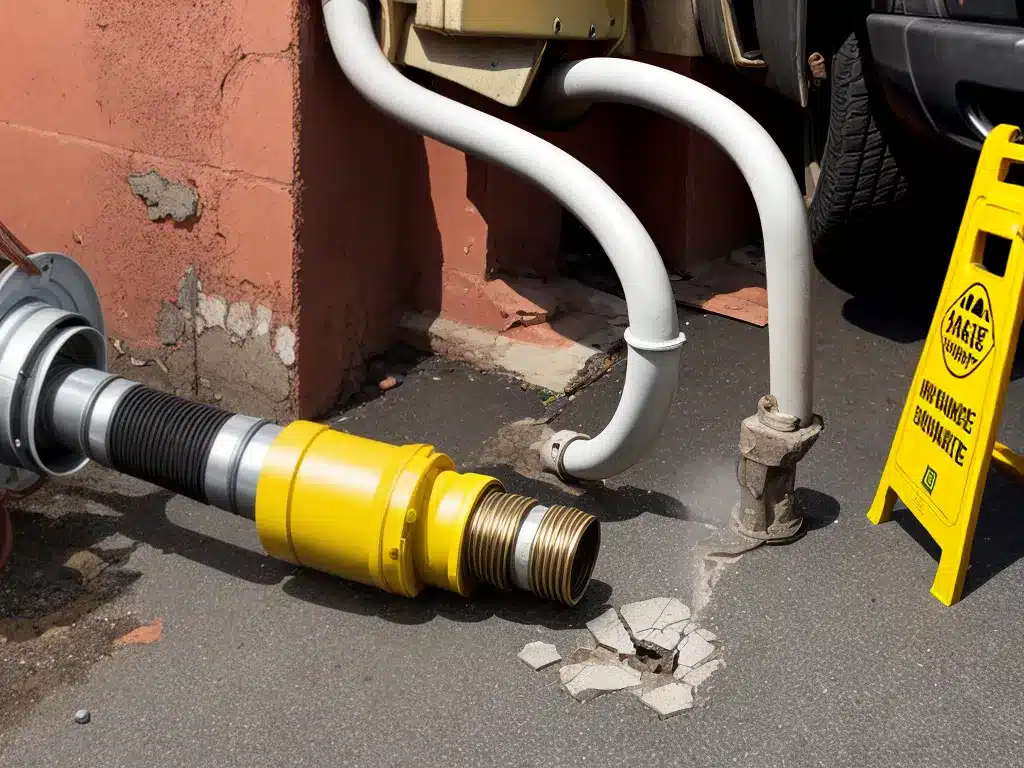What Causes Gas Leaks?
Gas leaks can occur for a variety of reasons. The most common causes include corrosion of pipes, damage from excavation or construction, loose fittings, and appliance malfunctions. Gas leaks are dangerous because many gases are odorless, colorless, and highly flammable. Thankfully, there are ways to detect leaks before they become hazardous. Being able to identify the signs of a gas leak could save your home and health.
Corrosion of Pipes
Metallic gas pipes corrode over time when exposed to moisture, which causes leaks. Galvanized pipes have an average life span of 40 years before corrosion causes small leaks. The older your home, the more likely you’ll have corrosion in the gas piping. Even a pinhole leak allows gas to escape into your home.
Damage During Construction
Excavation and construction accidents often break gas lines. Heavy machinery used in landscaping and construction projects can easily crush pipes buried a few feet underground. Even a dent in the pipe causes weaknesses that expand into leaks over time. A damaged sewer line located too close to a gas line also risks compromising the pipe.
Loose Fittings
Gas appliances have threaded fittings and rubber gaskets to seal connections. These fittings can vibrate loose over time, especially if the pipes shift. Loose fittings allow gas to leak before ever reaching the appliance. Tightening fittings with an adjustable wrench reduces leaks from loose connections.
Appliance Malfunctions
Faulty appliances like water heaters, stoves, and furnaces cause most gas leaks within the home. Components wear out over time, like rubber valve seats and burner hoses. Replacing damaged hoses, valves, and fittings repairs most appliance-related leaks.
How to Detect a Gas Leak
Thankfully, our noses are effective gas leak detectors. Adding sulfur compounds called mercaptans make natural gas smell like rotten eggs, while propane contains a garlic-like odorant. If you ever suspect a leak, do not dismiss a suspicious odor. Here are the most common signs of a gas leak.
A Distinct Sulfur or Rotten Egg Smell
The odorants added to natural gas and propane make leaks obvious. If you smell an egg-like odor anywhere in or around your home, suspect a gas leak. The intensity depends on the size of the leak, but do not ignore even a faint smell. Odorants only detect leaks of natural gas or propane. A gas like carbon monoxide has no odor, so install CO detectors.
Higher than Normal Gas Bills
A significant and unexplained spike in your gas bill may indicate a leak. Compare bills from the last several months. If there is a noticeable increase without any other explanation, inspect your home and appliances for possible leaks. Tiny leaks allowing gas to continuously seep out can substantially increase your bill.
Hissing, Whistling, or Blowing Sounds
Pressurized gas escaping through a small opening makes audible sounds. If you hear hissing or whistling from your gas appliances or along the gas line, this signals a substantial leak. The pitch or volume may fluctuate as the leak worsens. Never ignore strange sounds coming from your gas supply.
Dead or Discolored Vegetation in Unusual Places
Because gas leaks underground, vegetation near pipelines or appliances can show damage. If you notice dead grass or plants over the gas line or appliance vents, an underground leak may be suffocating the roots. Continuous exposure to leaking gas can kill plants and stain leaves yellow, brown, or black. Plants losing vigor without another obvious cause may be reacting to gas exposure.
Dirt or Dust Blowing from a Crack or Hole
Natural gas and propane are naturally pressurized, so leaks jet out dirt and debris. Look for unusual holes in soil with blowing dust or dirt particles. The force of leaking gas creates a pit or depression on the ground in some cases. White crystalline buildup around vents or gas lines also signals a long-term undetected leak.
What to Do if You Suspect a Leak
Gas leaks become exponentially more hazardous over time. If you detect any of the above signs, take immediate steps to ensure your safety. Here is a quick overview of what to do and who to call if you suspect a leak.
-
Evacuate the building – Do not stay inside or ignite any flames if the leak is indoors.
-
Avoid using electrical devices – Sparks from electronics could ignite the gas.
-
Open windows – Ventilate the area to prevent gas accumulation.
-
Shut off the gas – Turn the main valve off if you know the location and feel safe doing so.
-
Call the gas company – Alert your gas provider about the possible leak right away.
-
Call 911 – Dispatch can alert first responders to evacuate buildings and perimeter the area.
-
Do not re-enter the building until the fire department declares it safe again.
Never assume a minor leak will take care of itself. Gas leaks present an immediate fire and explosion risk. Take quick action at the first suspicion of a leak to get professional assistance mitigating the hazard. Do not attempt repairs yourself unless you have training and experience working with gas lines. With prompt detection and response, experts can repair leaks and prevent catastrophic damage to your home.







